

Free Education Sites & Online Learning Courses & Providers. MOOCs & Academia. Coursera. What is necessary and what is contingent in MOOC design. A new classification for MOOCs – Gráinne Conole. Gráinne Conole is Professor of learning innovation at the University of Leicester.
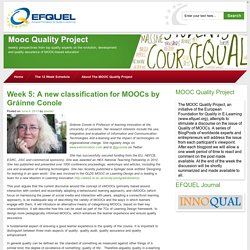
Her research interests include the use, integration and evaluation of Information and Communication Technologies and e-learning and the impact of technologies on organisational change. She regularly blogs on www.e4innovation.com and is @gconole on Twitter. She has successfully secured funding from the EU, HEFCE, ESRC, JISC and commercial sponsors). She was awarded an HEA National Teaching Fellowship in 2012. HarvardX, edX, and MOOCs proving effective at educating. During the summer break on campuses nationwide, providers of massive open online courses (MOOCs) were evidently hard at work developing their fall-term offerings and broadening their capabilities—and were the subject of still more comment and analysis as technology influences higher education.
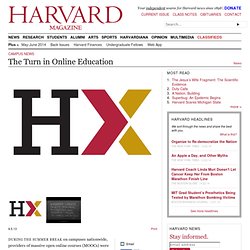
Some highlights appear here. HarvardX Enrollments and Aims HarvardX reported that combined enrollments in all 17 University courses offered through the edX venture with MIT exceeded 500,000 as of mid August, with “Introduction to Computer Programming” (160,000 registrants) and “Justice” (70,000) leading. A special report on “Learning in the Digital Age” in the August Scientific American presented diverse perspectives on MOOCs, adaptive-learning technologies, and their use in varied classroom settings. Of MOOCs and MMORPGs — The Transformation of Education. And how we learn Education.
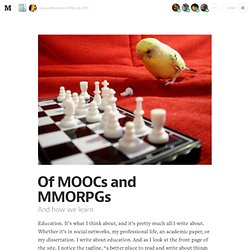
It’s what I think about, and it’s pretty much all I write about. Whether it’s in social networks, my professional life, an academic paper, or my dissertation. I write about education. MOOC Mania: Debunking the hype around massive open online courses. Illustration by Jacob Thomas In the fall of 2011, Stanford University offered three of its engineering courses—Artificial Intelligence, Machine Learning, and Introduction to Databases—for free online.

Anyone with Internet access could sign up for them. As Sebastian Thrun, the director of Stanford’s Artificial Intelligence Laboratory, tells the story, he assumed just a handful of people would enroll in his graduate-level AI class. Instead, more than 160,000 students registered. The MOOC Guide. Webinar: What is a MOOC? Mooc? What’s a Mooc? Survey reveals online revolution is news to large proportion of European universities More than four in ten European universities have not heard of massive open online courses (Moocs), according to a new report.
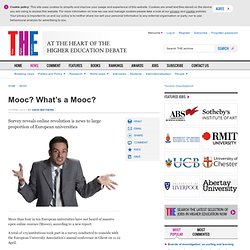
A total of 175 institutions took part in a survey conducted to coincide with the European University Association’s annual conference in Ghent on 11-12 April. The responses reveal that 58 per cent knew what a Mooc was, although 88 per cent wanted to learn more. Just a third could confirm that Moocs had been discussed at their university, according to the report, Internationalisation in European higher education: European policies, institutional strategies and EUA support. The vast majority of the questionnaires were filled in by a university’s international office or by senior management. Dr. Keith Devlin: MOOCs and the Myths of Dropout Rates and Certification. When the second iteration of my free mathematics MOOC starts this weekend, I anticipate at least 30,000 students will sign up.
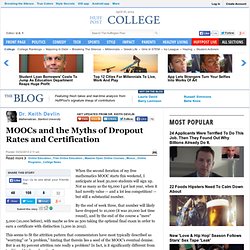
Not as many as the 65,000 I got last year, when it had novelty value -- and a lot less competition! -- but still a substantial number. Learning analytics at Stanford takes huge leap forward with MOOCs. By R.
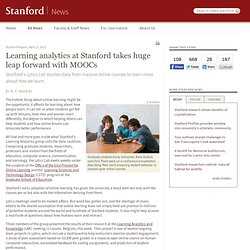
F. 10 hot tips for moocers. Now that I have participated in a mooc, I am naturally qualified to dispense expert advice about them.
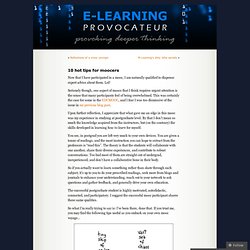
Lol! Welcome to the Brave New World of MOOCs (Massive Open Online Courses) A Tale of Two MOOCs @ Coursera: Divided by Pedagogy. The Web as a classroom is transforming how people learn, is driving the need for new pedagogy; two recently launched courses at Coursera highlight what happens when pedagogical methods fail to adapt.
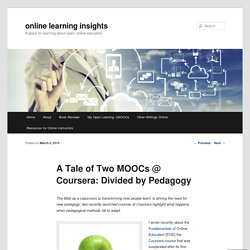
Divided pedagogy I wrote recently about the Fundamentals of Online: Education [FOE] the Coursera course that was suspended after its first week and is now in MOOC hibernation mode. Over thirty thousands students signed up for the course hoping to learn how to develop an online course. It was a technical malfunction when students were directed to sign-up for groups through a Google Doc that shuttered the course, along with hundreds of student complaints about lack of clear instructions, and poor lecture quality. How MOOCs Could Meet the Challenge of Providing a Global Education. As online education platforms like Coursera, edX, and Udacity burst onto the scene over the past year, backers have talked up their potential to democratize higher education in the countries that have had the least access (see “The Most Important Education Technology in 200 Years”).
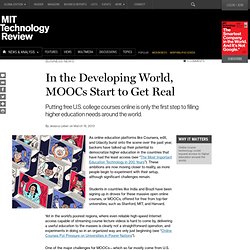
These ambitions are now moving closer to reality, as more people begin to experiment with their setup, although significant challenges remain. Students in countries like India and Brazil have been signing up in droves for these massive open online courses, or MOOCs, offered for free from top-tier universities, such as Stanford, MIT, and Harvard.
One of the major challenges for MOOCs—which so far mostly come from U.S. universities—is to tailor the content of courses to a diverse worldwide audience with any number of combinations of language, educational, motivational, and cultural backgrounds. “What we have today is a very nice first step,” says Anoop Gupta, a distinguished research scientist with Microsoft. Hybrid Pedagogy: A Digital Journal of Teaching & Technology. Open course resources. MOOCs. MOOCs: Top 10 Sites for Free Education With Elite Universities. MOOC stands for Massive Open Online Courses. Although there has been access to free online courses on the Internet for years, the quality and quantity of courses has changed.
Access to free courses has allowed students to obtain a level of education that many only could dream of in the past. This has changed the face of education. In The New York Times article Instruction for Masses Knocked Down Campus Walls, author Tamar Lewin stated, “in the past few months hundreds of thousands of motivated students around the world who lack access to elite universities have been embracing them as a path toward sophisticated skills and high-paying jobs, without paying tuition or collecting a college degree.”
Although MOOCs are the latest trend, not everyone agrees that schools should offer them. Free Online Open Courses. Written by: Thomas Broderick Universities, colleges, and private organizations offer free online college courses to help students acquire new knowledge and skills. These courses cover a variety of traditional academic topics and other subjects that can lead to career advancement and personal enrichment. University group open sources its code for online learning. Education is already accessible online. Now it’s going open source too. Nonprofit edX is less well known than Coursera and Udacity, its for-profit competition. But it also offers online courses from top universities for free. Today, the organization is making available some of the code that powers its site open source.
EdX announced that it will be releasing source code to its XBlock software on GitHub under the Affero General Public License. Anant Agarwal, the MIT professor who serves as edX’s president, said in an interview that online learning is the “greatest innovation in education since the printing press.” Coursera.org. Coursera adds first international university partners, raises additional $6M. Online education startup Coursera isn’t just revolutionizing learning in the U.S., it’s refashioning higher education for people around the world.
Since its earliest courses, Coursera’s student population has been highly international (it’s currently 35 percent domestic, 65 percent international). And, in addition to announcing $6 million in new funding, the startup Tuesday said that it’s adding its first international university partners. Coursera’s new investment — which includes $3.7 million from the California Institute of Technology and the University of Pennsylvania, as well as $2.3 million from current funders New Enterprise Associates and Kleiner Perkins Caufield & Byers — brings its total funding to $22 million. Coursera: Online education is a new medium, we’re all inventing the basic concepts Data collection and analysis remain key factors. Canvas Network. Massive Open Online Support for Education. Online Schools - Education News.
New California Legislation to Provide MOOC Courses Full Academic Credit. The MOOC Newsletter ~ by Stephen Downes. Arne Krokan. NTNU-professor blir norsk MOOC-pioner - Universitetsavisa. Bruken av nettbaserte kurs har i høst eksplodert ved en rekke universiteter i USA. NTNU-professor Arne Krokan er overbevist om at dette er framtida, og går nå i gang med å lage sin egen MOOC. Publisert: 04.12.2012 kl. 06:00 Endret: 04.12.2012 kl. 09:17. Velkommen til en ny utdanningshverdag! Hun har verdens beste lærere hjemme i stuen. Denne saken er hentet fra Aftenpostens økonomimagasin, som kommer med papiravisen hver torsdag. MOOC – er det dette vi har ventet på? Studerer i USA, jobber i Knarvik.
80 studenter klare for å «mooce» Om utdanning i Cyberspace. Teknologi endrer verden, også utdanning. Verden står foran deg som en mur av muligheter: Arne Krokan at TEDxOslo.